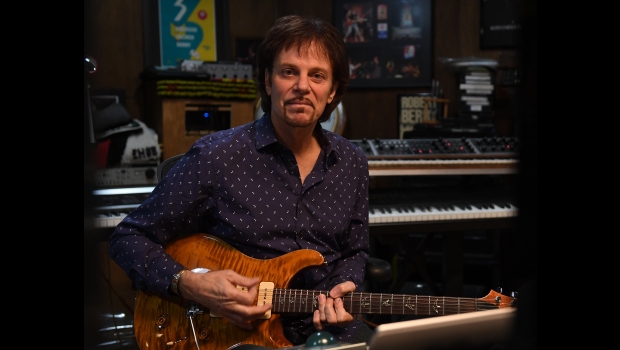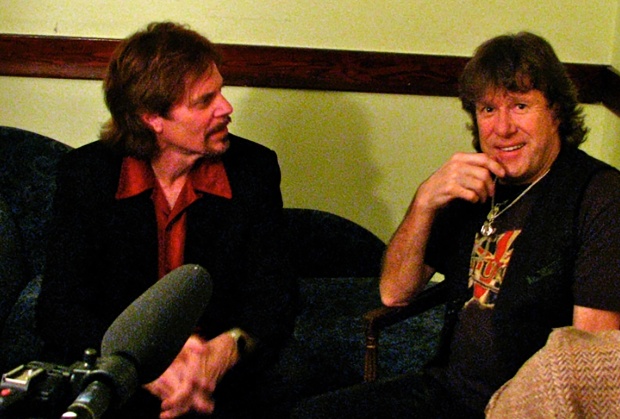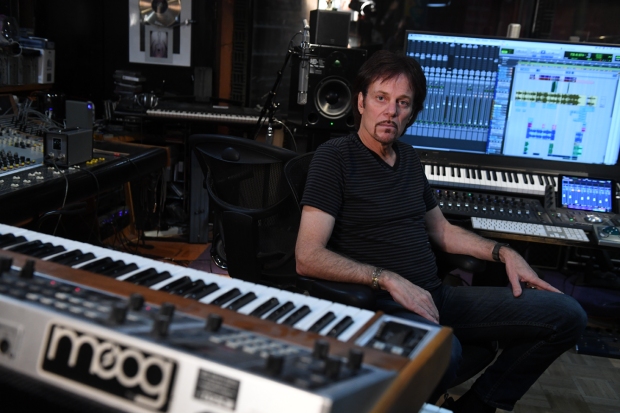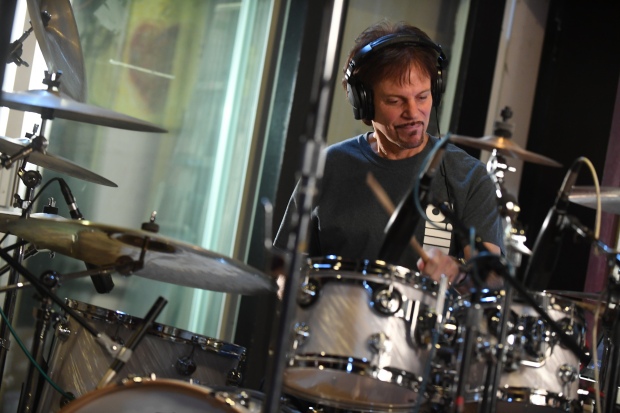3.2 The Rules Have Changed: A Remarkable Memorial To Keith Emerson
Keith Emerson and Robert Berry were planning a follow-up to their 1988 3 recording at the time of Emerson’s death. Berry is now about to release the new album, a remarkable memorial to Emerson.
 When American singer and multi-instrumentalist Robert Berry was introduced to the legendary keyboard player Keith Emerson by Carl Palmer in 1987 they came together to form the band 3. The aim was for a more melodic, song orientated sound than the extravagant prog-rock of Emerson, Lake and Palmer, hoping to emulate the success of another of Palmer’s bands, Asia.
When American singer and multi-instrumentalist Robert Berry was introduced to the legendary keyboard player Keith Emerson by Carl Palmer in 1987 they came together to form the band 3. The aim was for a more melodic, song orientated sound than the extravagant prog-rock of Emerson, Lake and Palmer, hoping to emulate the success of another of Palmer’s bands, Asia.
The result was the album …To The Power Of Three, released in 1988 to mixed reaction from the critics and fans who were perhaps looking for something more akin to Keith Emerson’s previous output. Record label Geffen urged the band to go back into the studio to begin work on a second album but Emerson felt uncomfortable with Geffen’s momentum-stifling and inconsistent strategy that had ultimately cut the first album’s success short. With several new songs already written, the band decided to call it a day.
Remarkably, two years after Emerson’s untimely death, Robert Berry is now about to release a follow-up album: 3.2 – The Rules Have Changed which should set the record straight about what a force 3 could, and should, have been.
“To be honest,” Robert told me on his recent visit to London, “Keith wanted nothing to do with 3 until they put out a live album, in 2015 I think, and he called me one night. He had a glass of wine and he had that album on.
“He goes: ‘Robert!’
“‘Who is this?’
“‘It’s Keith!’ He’s all excited!
“‘What’s going on?’
“‘We were a good band! We were a really good band! Listen to this, it’s fiery, the playing!’
“‘God, Keith, I’m really glad to hear that,’ and there was my open door to try and do a follow-up album.”
The first album wasn’t a bad album at all. It was a good example of the style some established artists were adapting to satisfy the demands of the American FM stations in the eighties, it just wasn’t what fans of ELP were waiting for.
“You know,” says Robert, “we were thrown together and wanted to start this band but Geffen Records had spent some money developing me as a solo artist. We had some of those songs that Geffen wanted on there. They were songs that weren’t right for what 3 should have been doing – and they were my songs!
“At the time I thought this should work and, honestly, Keith wanted a little of the success that Carl had with Asia, he was wanting to do that, too. Looking back, it was all just done too fast.
“That said, when the first album ran its course, and we toured, I felt I really knew what we should be doing and what would be accepted by that fan-base, It was certainly big enough to perpetuate a career and keep people happy with the music.
“Keith was so criticised by his fans, his personal keyboard-loving fans, that he just couldn’t see doing another album. He felt really bad about it.
“A lot of people say ‘Oh, I love the songs on that album!’ I’m glad they do – and I do too – but to be a real band we needed to get to our second album. We needed to get our style honed in and know what we’re talking about, what we want to do and stand behind it which, of course, was my vision of that. What Keith and I talked about became 3.2.
Some fragments appeared on Robert’s 1992 album Pilgrimage To A Point, most notably Last Ride Into The Sun and hinted at what might have been.
“Yes, Last Ride Into The Sun. I was showing Keith and Carl ‘Look, I know what we should be doing, I get it!’ I had a progressive background but the record company was trying to get me to do more straight rock. I said ‘This is what we should be doing,’ but it was too late and the fans had criticised Keith so much that he wanted nothing to do with it.”
Robert felt that he could not do a follow-up album without Keith. And here it was, the chance to set the record straight. Keith and Robert talked about a second album and Robert called Serafino Perugino at Frontiers Records who had always wanted Robert to get 3 together again.
“Once I got the call from Keith and I got us the budget, complete artistic control and the time frame we wanted, Keith was really excited about it. In fact I got him more money. ‘How d’you get me that much money?’
“‘What you talkin’ about? You’re Keith Emerson!’
“He goes ‘Nobody cares any more!’
“‘What do yo mean, nobody cares? Serafino cares!’
“He says ‘You should be my manager!’
“For him to say no one cares any more was just so untrue. For me to get him such a good deal, it empowered him in a way I hadn’t seen for a long time.”
Robert and Keith were both in California and began to talk in detail, over the phone, about the structure and detail of the new album.
“We spoke a lot at night,” Robert explained, “and he had his Casio piano, he was raving about the hammer-action. In my studio I had my little Casio and the computer with Pro Tools, and we’d sort of jam back-and-forth on the phone and talk about parts. He’d play (Robert hums a short tune) and I’d try to play it back so I could record it. He’d go ‘No! No! No! There’s an F in there!’
“And then ‘That tonal cluster, I can’t tell what it is on the phone, Keith.’
“‘It’s like a C, C#, D’ All these notes, all clustered together, so I’d play it.
“‘Yeah, yeah, that’s it!’
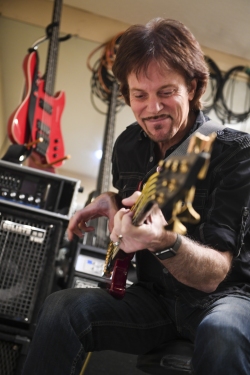 “We did all the writing and outline form that way, so I had five of the songs laid out in outline form and all the little bits he came up with, some of them I just had to write the verse and chorus and put lyrics to them.
“We did all the writing and outline form that way, so I had five of the songs laid out in outline form and all the little bits he came up with, some of them I just had to write the verse and chorus and put lyrics to them.
“We had a mixture of stuff including a cassette tape from 1986 with a song on it that Keith had played for me. For me, the guy that wrote the songs on the first 3 album – the pop songs – I said ‘This is too straight rock, I don’t think I could do anything with this. Years later, when Keith said ‘What about that one? We never used it,’ it was really brilliant. How could I have passed this up at the time?
“Dream What You’re Dreaming Now. The track was done. I had to re-record it but basically it was done. I wrote the melody and the lyrics and a couple of new connecting parts but that was from 1986 when we first got together.
“Some of the things from the cassette tape I used for links in other songs. I had written (opening track) One By One not knowing that ELP had a song of that name (on the final ELP album In The Hot Seat, 1994) because Keith wanted to call the new album 1. I think he wanted to put 3 behind him. This would be the first album – and we would do it right this time!
Sadly, in March 2016, Keith Emerson took his own life.
“For many months I didn’t want to do the album,” Robert admits. “It was really towards the end of 2016 that I got back on the phone and started saying ‘I was talking to Emerson and he was thinking about playing on it, then he said it was too hard for him. It kind of got me going on it again. I called Carl and he said ‘No, I’m focused on the ELP legacy. I understand, I’m proud of you for doing it, you should do that!’
“Keith had wanted to call it 1. Well, ok, if I’m going to do this I’m going to do this as one.
“I got to start with a lot of things that Keith had played. If it wasn’t for the estate asking me to take his playing off it… I could use his writing but I couldn’t use his playing, that was my deal with them. If it wasn’t for that, he’d be on there!
“I had lots of his recordings that sounded great and, of course, the playing was great and the sound quality and the tones of all the keyboards were fantastic. Luckily I have all those keyboards, I have a Hammond B3, I have a Moog, I have all this stuff and D50 was a big part of the 3 sound. I have all that so I could recreate the sounds.
“Articulation phrasing, playing everything, I meticulously worked and worked my fingers back with the right fingering to get it just right. It was very hard for me to do because I’d sort of left keyboards behind. I was a classically trained pianist, I had 10 years of lessons, majored in music in college, which was a classical background, but I hadn’t played like that for so long.
“On the first track (One By One) there was three little spots of Keith’s stuff and the second track there’s a couple of spots of something else. I had to fill-in the rest of it, and that’s where the magic happened, where I stood back after he was gone and asked ‘What would Keith do here?’
“I kept saying that… and it was strange. I felt like he was working through me. There are things on there that I just wouldn’t have thought of without that…. I don’t know, whatever it was.”
3.2 – The Rules Have Changed has been a labour of love for Robert Berry and a very personal one as he explores his relationship, and admiration, for Keith Emerson. This remarkable album is full of Emerson trademarks and a great celebration of Emerson’s life and legacy.
Our Bond reprises a number of melodies that are integral with the Emerson legend and also provides a direct link to the first 3 album with the inclusion of Spanish lyrics, as did Desde la Vida, the most progressive track on that first album.
“Carl and I were writing (the Desde la Vida) lyrics together, him giving me the Spanish, and I really enjoyed that and, I have to say, there is such a huge fan-base in South America because of that song. The respect they have for the band is different to anywhere else because we actually took the time to do something Spanish in it. I thougth I have to honour that, I have to do it. I’m not the one that speaks Spanish but once I decided to do this alone I wanted to be true to me taking ownership of what I think the second 3 album would be, how I thought it should go and how I thought it would go with Keith, try to push the limits of what I do – and do it!”
In being true to the 3 sound, Robert has also replicated Carl Palmer’s drumming style, in itself no mean feat, but by now I have come to realise that this multi-instrumentalist is, quite possibly, rock music’s best kept secret!
“Carl’s drumming surrounds the melody and the moving keyboard parts. I recognise that about his style, he’s not just a straight beat-player, he plays with the music. A lot of times I found myself saying I have to play with the music because it makes it a little more musical, a little more progressive, not so pedestrian. I don’t say this for ego reasons but I’m capable, so I do.”
‘Capable’ does not quite do Robert Berry justice. The outstanding quality of musicianship in the prog arena is what has always attracted me and Berry seems to excel in all areas. Having formed Hush as a high-school Yes and Genesis covers band, they went on to create original prog material. “I stuck with the progressive thing because I like it. To me it’s just musical, I don’t believe in calling it progressive but that’s the label it gets, it’s just very musical music with a lot of depth to it. I do prefer it when it has good lyrical content, that applies to what’s going on in the world, in life.”
Robert went on to replace Steve Hackett in GTR, playing alongside Steve Howe but left after friction with the band’s vocalist. He continued to work with American rock band Ambrosia, his long running project Alliance (with members of Boston, Sammy Hagar and Night Ranger), December People, the Greg Kihn Band and solo output whilst being in constant demand as a producer and working on several prog-rock tribute projects.
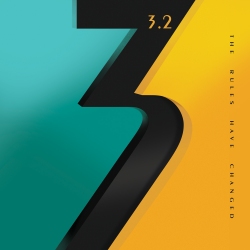 Unsurprisingly, Robert Berry has not had the time to play live outside of America and Canada and remains largely unknown in Europe. “I’m the most successful guy you’ve never heard of!” he laughs. “What I’m dreaming now is a tour next year. I hadn’t started out thinking about that but now that’s really what I want to do with it. I have a pretty good prog legacy with the Magna Carta tribute series I did, Roundabout and others. People have never heard those live. I have a few songs off the first 3 album, a few off the new album, my time with Ambrosia, Pilgrimage, just with that stuff alone, I feel I could almost do a greatest hits tour (he laughs out again) of this that people have never heard!”
Unsurprisingly, Robert Berry has not had the time to play live outside of America and Canada and remains largely unknown in Europe. “I’m the most successful guy you’ve never heard of!” he laughs. “What I’m dreaming now is a tour next year. I hadn’t started out thinking about that but now that’s really what I want to do with it. I have a pretty good prog legacy with the Magna Carta tribute series I did, Roundabout and others. People have never heard those live. I have a few songs off the first 3 album, a few off the new album, my time with Ambrosia, Pilgrimage, just with that stuff alone, I feel I could almost do a greatest hits tour (he laughs out again) of this that people have never heard!”
Certainly the music from 3.2 would be a highlight of any such live shows, although it may be difficult to find a keyboard player to equal Berry’s authentic Emerson sound. “I think it would be fun to play it. I just have to find a keyboard player that’s crazy enough to think that he can take on this stuff, that will be a big task.”
After the disappointing reaction to the first 3 album, 3.2 is a triumph and a work that Keith Emerson would surely have been proud of.
“I think he would. I have to tell you, when I played him Last Ride Into The Sun 30 years before, he looked at me, he goes: ‘That sounds like me!’ That’s all he said, he was so done with it!
“I said: ‘Well, do you like it?’ He said: ’Yeah – but it sounds like me playing!’
“I said: ‘Just think, if you were playing, how much better it would be!’
“The main thing for me is it feels like it’s getting a lot of love from people who really care about Keith and that’s the kind of success that I wasn’t expecting from it. It’s really something. The comments of the people… they’re feeling this album and the music and I don’t think I’ve ever been involved in anything like that before, this is really something.”
3.2 – The Rules Have Changed (Frontiers Music FR CD 883) is released on 10th August 2018.
All photographs by Dave Lepori and used with kind permission
Except image of Robert Berry with Keith Emerson – courtesy of The Publicity Connection
LINKS
Robert Berry – Website | Facebook | Twitter
Keith Emerson – Website | Facebook
The Publicity Connection – Website | Facebook

